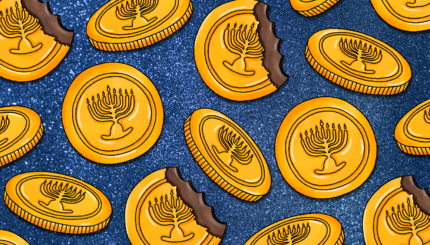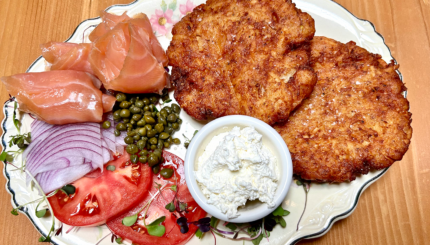Our Makom NY community just completed our third High Holy Day season.
We are humbled and gratified to have shared these High Holy Days in a beautiful new space with many new people, new programming options and more participation.
People expressed satisfaction with the set-up, the logistics, the options offered. They praised our cantorial soloist; they raved about the beautiful music; they complimented me on my sermons. It seemed that all our hard work and hours of collaboration, conversation and planning came to fruition.
So what’s the ‘biggest’ takeaway from these holidays? What made numerous grown men cry? It’s one sweet little moment that will stay with me – forever.
It happened on Yom Kippur afternoon. We had moved from the large social hall where we had created a beautiful sanctuary, to the intimacy of the smaller sanctuary. At 4 pm, nearly 100 people gathered for the afternoon service. At the back of the room sat a woman, her husband and her mother. All three were new to our community. The woman approached our educator to inquire about some of the other women in Makom, and how comfortable they seem to be wearing tallitot (prayer shawls).
“I could never do that,” said the woman. “It’s not the way I was raised, and my rabbi would never allow women to do that.”
She continued, “In fact, he didn’t believe that women should count in a minyan (the 10 people required for a service) or even have an aliyah (being called up to the Torah).”
And then, sounding almost wistful and perhaps a bit embarrassed, she said: “You know, I’ve never had an aliyah. I have never been on a bimah. Neither has my mother.”
Our educator could certainly relate to that, remembering that it wasn’t until she was in her 40s that she had her first aliyah.
She invited the woman and her mother to have an aliyah during the Torah service.
“Oh no,” said the woman. “I couldn’t. I can’t make that kind of change at this stage of my life.”
Our educator responded: “You know, you don’t have to change anything. Maybe you are ready to be open to the new experience. And if you do not like it, you never have to do it again.”
During the Torah service, it is our custom to have group aliyot during the High Holy Days. The first aliyah went to those who needed prayers for healing. The second aliyah went to those who had suffered a loss during the past year. And for the third aliyah, I called up those who had not had an aliyah during this High Holy Day season and wanted one.
A regular Makom participant made her way up to the bimah. We motioned for the woman in the back to come forward, and she did rise but said she could not come up because her mother was not able to ascend the bimah.
So in the intimacy of this sanctuary, and in the holiness of Yom Kippur afternoon, that sweet little special moment happened that brought tears to dozens. Several people jumped up, and together we picked up the table holding the open Sefer Torah and maneuvered it off the bimah and down onto the floor.
The woman and her mother walked slowly to the table, and holding each other in a tight embrace, with tears dripping down the woman’s face, they chanted the Torah blessings for the first time – together.
I did not realize until later that there were very few dry eyes in the crowd. I couldn’t look up, for I was keeping back my emotion, and my cantorial soloist was already tearing.
At Makom, we are proud to say that we meet people where they are. On this Yom Kippur afternoon our community, literally, did just that.



